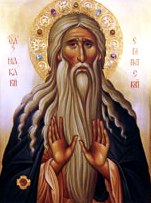Macarius of Egypt
| Saint Macarius of Egypt | |
|---|---|

An icon of Saint Macarius of Egypt
|
|
| Born | c. 300 Shabsheer (Shanshour), Al Minufiyah Governorate, Egypt |
| Died | 391 Scetes, Egypt |
| Venerated in |
Orthodox Church Oriental Orthodox Churches Roman Catholic Church |
| Major shrine | Monastery of Saint Macarius the Great, Scetes, Egypt |
| Feast | 15 January (West, Roman Catholic) 19 January (Eastern Orthodox) 27 Paremhat (= 4 April) (Oriental Orthodox) |
Macarius of Egypt (c. 300 – 391) was an Egyptian Christian monk and hermit. He is also known as Macarius the Elder, Macarius the Great and The Lamp of the Desert.
Macarius was born in Upper Egypt. A late tradition places his birthplace in the village of Shabsheer (Shanshour), in Al Minufiyah Governorate, Egypt around 300 A.D. At some point before his pursuit of asceticism, Macarius made his living smuggling saltpeter in the vicinity of Nitria, a vocation which taught him how to survive in and travel across the wastes in that area.
St. Macarius is known for his wisdom. His friends and close kin used to call him “Pidar Yougiron” which meant the “old young man” or “the young man with the elders’ wisdom.” At the wish of his parents he entered into marriage, but was soon widowed. Shortly after, his parents departed as well. Macarius subsequently distributed all his money among the poor and needy. He found a teacher in an experienced Elder, who lived in the desert not far from the village. The Elder accepted the youth, guided him in the spiritual science of watchfulness, fasting and prayer, and taught him the handicraft of weaving baskets. Seeing his virtues, the people of his village brought him to the bishop of Ashmoun who ordained him priest.
A while later, a pregnant woman accused him of having defiled her. Macarius did not attempt to defend himself, and accepted the accusation in silence. However, when the woman's delivery drew near, her labor became exceedingly difficult. She did not manage to give birth until she confessed Macarius's innocence. A multitude of people then came asking for his forgiveness, but he fled to the Nitrian Desert to escape all mundane glory.
While at the desert, he visited Anthony the Great and learned from him the laws and rules of monasticism. When he returned to the Scetic Desert at the age of forty, he presided over its monastic community for the rest of his life. Ten years after going into the desert, he became a priest.
For a brief period of time, Macarius was banished to an island in the Nile by the Emperor Valens, along with Saint Macarius of Alexandria, during a dispute over the doctrine of the Nicene Creed. At their return on 13 Paremhat, they were met by a multitude of monks of the Nitrian Desert, numbered fifty thousand, among whom were Saint Pishoy and Saint John the Dwarf.
...
Wikipedia
